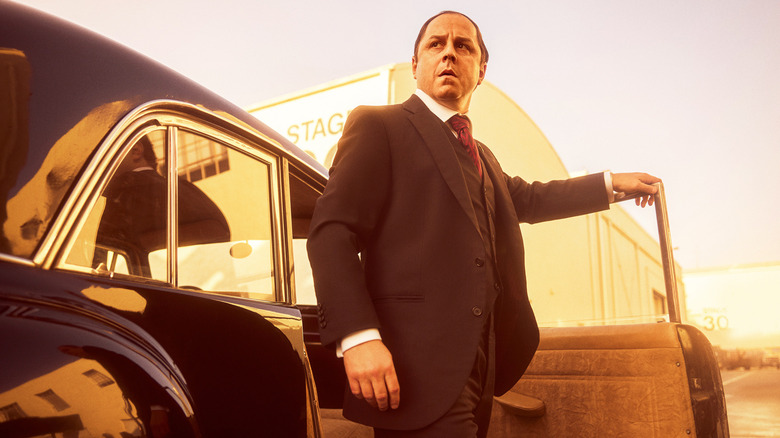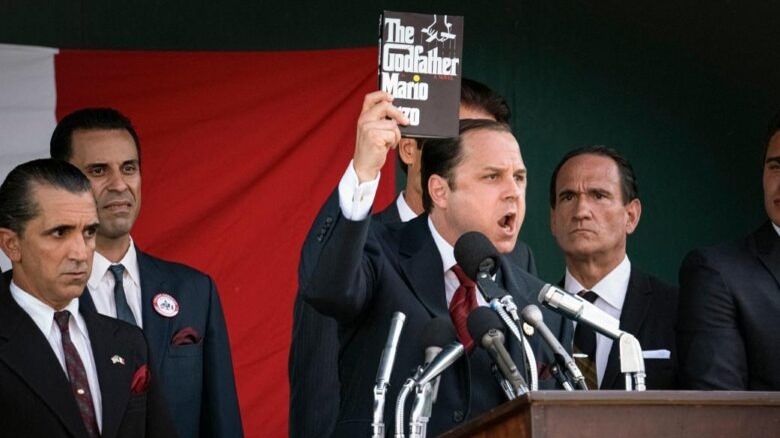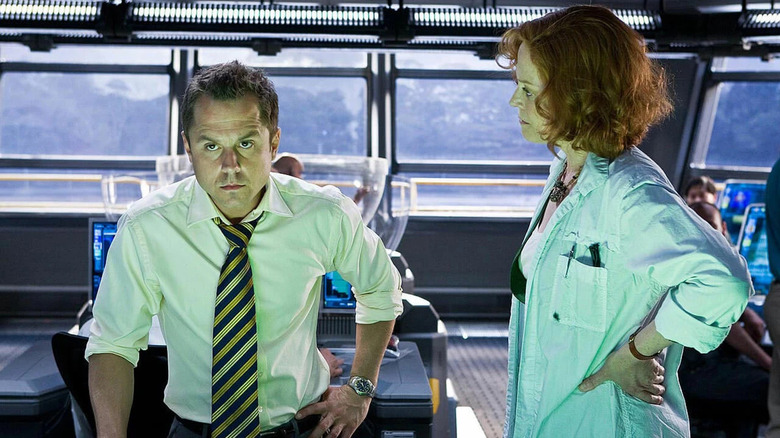Rebel Without A Cause Made The Offer Star Giovanni Ribisi Want To Have More Fun [Interview]
Giovanni Ribisi goes big in the new miniseries, "The Offer." The actor, known for movies like "Saving Private Ryan" and "Ted," plays mob boss Joe Colombo. At first, he's one of the greatest threats in the show. Colombo wants to stop "The Godfather" from getting made, since he believes it'll reinforce stereotypes about Italian-Americans. Of course, he failed in killing the movie but maybe not for the reasons audiences might expect. You'll have to watch the series for the full story.
Back to Ribisi's performance, the actor is chewing up the period scenery with glee. The walk, the voice, and his gestures are all front and center as Ribisi plays the mob boss as a larger-than-life figure while, hopefully, avoiding mob boss stereotypes. It's a fun performance by design, not accident. After watching "Rebel Without a Cause," the actor wanted to enjoy himself a bit more.
I needed to have more fun in my approach.
[Showrunner] Nikki Toscano said your performance turned out a lot funnier than she expected.
I think I had that same reaction as well. It was a lot funnier than I expected.
How'd that happen?
You know, I don't know. I think it was probably a result, more or less, of during the whole Covid period and missing going to movies, there was a moment where I finally was able to go to a movie and see something in a public venue with other people. I realized how just fun it was to go to the movies, and I had the striking realization that I needed to have more fun in my approach. I think it's so important to find the sense of humor.
The initial conception of this for me was trying to avoid all of the stereotypes and cliches of someone who's attempting to be intimidating. The very superficial experiences that I've ever had with people from this life, I just always found myself in stitches laughing hysterically.
What movie made you want to have more fun in your approach?
I saw "Rebel Without A Cause" at the New Beverly. I mean, it's such the event with the Cinemascope and James Dean.
Joe is such a big character. When you're making a transformation that large, where do you start?
It was really just doing the work until you feel confident with something. It's pacing in a room for hours and weeks and days until you feel like you're seated into something and recording yourself. The voice suddenly starts making you walk differently. It's all of that, but that all just goes out the window right when you arrive on set.
You've done some cinematic television in your career. At this point, is there much difference between movies and TV when you're on set?
This was the closest it's ever been to feeling like a film because you have filmmakers coming in, and [director] Dexter [Fletcher] was taking so many chances, and we had a two week rehearsal period. You don't even get that in movies anymore. Other productions, there's nothing quite like doing a movie, especially when you're taking the time and the prep. Namely, because you're afforded a lot more time in order to set it up and get the production design right. Yeah, my heart's always with movies.
How'd rehearsal here help?
The greatest thing was right before we started the rehearsals, the Sunday before the Monday we started, we all got an email saying that Dexter wanted us to write and type out a full page of our character biographies. And then I was like, "Oh, wow. Okay, great." That pours out of you and you edit that down, and in the middle of that I get a phone call from Dexter saying, "Hey, yeah. So what we're going to do is we're all going to read them to each other, the whole cast and you're first." "What? Okay."
So then you get there and it's a big cast. We had people who had two scenes in the whole thing who had written their biography and it was such a great learning experience. And some of these actors had so much insight. It sort of just set the stage for like, "I don't care what medium we're doing," or whatever. "We're going to treat this like cinema." This was what Dexter was saying.
This has never been done on a set before!
When writing the biography, did you write it thinking, "How would Colombo write this?" Did you avoid the word mafia?
It definitely clarified just through the process. I read the biographies, the other books and just all the research, scouring the internet and all that. An objective started forming in my mind and values that were really specifically unique to him that really also made him into a person as opposed to the mafia stereotype, you know?
After all that research, what made him someone you can invest in and not a mob stereotype?
I just want to understand. The more I can find things that correlate to my own life, the more I can drive it, I think. I feel like he was somebody who was trying to legitimize his life and the idea of a mafia movie popularizing the term "La Cosa Nostra" or mafia, that's why it was such a big threat to him. Maybe he was trying to find a way out...
Was he really?
I don't know, but that's just a thought that I had about it. Something that I connected to, and he wasn't about to stow away on some boat and go to Brazil or something like that. He wanted to do it in a big way. And that was through the Italian American Civil Rights League and to get the support of the Italian people, whom he loved.
When you play a real guy, how close do you think you have to get?
Ultimately, even though these are true stories, we're portraying fiction just by virtue of the fact that somebody was sitting down, typing out words for us to say. By virtue of the fact that there's several different strains of interpretation going all the way through the edit. So that sort of gives you license to go, "Well, if we're going to do that, we're going to make this story, this unique story, as good as we can." And that's that.
The miniseries is about creating a new vision of a mob movie. You've had similar experiences, like making a new kind of war film with Steven Spielberg or a new fantasy film with James Cameron. There are other examples, but when you're with filmmakers pushing the envelope, is it obvious on the set or not something you fully know until you see the movie?
Probably both. Sometimes you take your chances and sometimes... I think it always goes back to the script and the director for me, that's just my personal thing. I think that specifically James Cameron, I don't even know if people comprehend, or maybe they've forgotten, what it took to get that movie made in the way that it was made and to be out there in the way that it was. He created literally another vessel, another infrastructure with projectors throughout America and Europe and throughout the world. New technologies, too. It seemed like, every other week, he would say in the most celebratory way, "This has never been done on a set before!" It was just incredible. It was really its own thing.
The first three episodes of "The Offer" are now available to stream on Paramount+.


